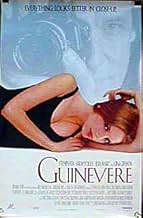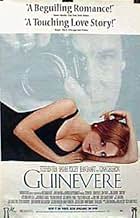CALIFICACIÓN DE IMDb
5.9/10
2.8 k
TU CALIFICACIÓN
Una joven se rebela y se involucra con un fotógrafo mucho mayor.Una joven se rebela y se involucra con un fotógrafo mucho mayor.Una joven se rebela y se involucra con un fotógrafo mucho mayor.
- Dirección
- Guionista
- Elenco
- Premios
- 2 premios ganados y 7 nominaciones en total
Sharon McNight
- Leslie
- (as Sharon Mcnight)
- Dirección
- Guionista
- Todo el elenco y el equipo
- Producción, taquilla y más en IMDbPro
Opiniones destacadas
Guinevere: Harper Sloane (Sarah Pollack) is a painfully shy young woman trapped in a household of lawyers lorded over by an alpha-mother (Jean Smart) who treats her like a servant. Destined to attend Harvard law school and join the pack, Harper finds her salvation in Connor Fitzgerald (Steven Rea), part-time photographer/philosopher, full-time con-man Svengali. Connor actually listens to what she says and offers her escape into an exciting bohemian lifestyle. Will he be her salvation or downfall? There are shades of Leaving Las Vegas in this film - it is dark and at times unpleasant - one scene in particular made me so uncomfortable I turned away from the screen. To its credit, Guinevere, like Leaving Las Vegas, is also a very good film. Sarah Pollack is outstanding as the withdrawn Harper (in stark contrast to her brazen, street-wise savvy Ronna in Go!). Although she's actually twenty, she looks fifteen, which helps to convey a believable vulnerability and transformation.
Rea is truly manipulative as Connor, more pathetic than sinister, who preys on young women - you're never quite sure if you should loathe or pity him. Finally, Jean Smart does an excellent job as the hard-as-nails matriarch, miles away from her smarmy character on Designing Women.
Well worth the price of admission.
Rea is truly manipulative as Connor, more pathetic than sinister, who preys on young women - you're never quite sure if you should loathe or pity him. Finally, Jean Smart does an excellent job as the hard-as-nails matriarch, miles away from her smarmy character on Designing Women.
Well worth the price of admission.
I can't say exactly what, but something is missing in this movie. Poor Connie. I think he gets less out of the relationships than the Guineveres. Maybe I like things "tied up" too much, but I wish we'd seen a little of Harper's work so we could judge just how well Connie taught her. A scene of her in a gallery or studio somewhere surrounded by her work as she answers a ringing telephone (presumably with Billie on the other end) would have been satisfying--no dialog necessary, just a look of sadness on her face. Whatever else, this movie sure spurred some dialog between my 25-year-old daughter and me.
Interesting that (along with another reviewer) I saw the connection between the Stephen Rea character, Connie, in this movie and Herman Wouk's Noel Airman in the 50's novel "Marjorie Morningstar" and talked about that as we walked home. And as big a bitch as Harper's mother was, she had it right as she saw through Connie. Beautifully acted by all principals!
Interesting that (along with another reviewer) I saw the connection between the Stephen Rea character, Connie, in this movie and Herman Wouk's Noel Airman in the 50's novel "Marjorie Morningstar" and talked about that as we walked home. And as big a bitch as Harper's mother was, she had it right as she saw through Connie. Beautifully acted by all principals!
This was a slow moving but interesting story about a 50 something bohemian photographer named Connie Fitzpatrick (Stephen Rea) who is a serial seducer of impressionable young women. His seduction is not really about sex, although that is part of it. Instead, it is more of an emotional seduction that involves his creating a symbiotic mentor/protégé relationship that puts him in control while feeding his ego. His latest conquest is Harper Sloane (Sarah Polley), a recent college grad from a wealthy family who is all set to go to Harvard Law School. Clearly lonely and vulnerable and not used to the attention of men, she falls prey to the charms of this free spirited older man and eschews law school to run off with him and live the artsy life.
Director/writer Audrey Wells, whose best previous writing credits were for "The Truth About Cats and Dogs" does an excellent job bringing this story to the screen in her directing debut. Her shooting of the scenes was sensitively done and brought forth a lot of the emotional elements of the story and the characters. It is clear that this was a labor of love for Wells, but as is often the case, directing one's own work takes away the objectivity about the script leaving most of the plot problems intact.
It is believable that an insecure girl could be lured into a relationship by a charming older man who overtly appreciates her and believes in her abilities. May/September romances (or more aptly in this case April/August) are common and usually happen for all the reasons depicted here. The biggest problem with the story was the introduction of Billie (Gina Gershon), one of Connie's earlier alumni, so early in the story. Billie warns Harper of the specific manipulative lines that Connie uses repeatedly with each of his love interests, almost by rote. She gives great detail right down to the way he touched her and the fact that he calls them all Guinevere.
At that point, Harper does exactly what one might expect, she leaves him. Shortly thereafter, the story loses all credibility as she eagerly goes running back to him, knowing full well that she is being totally and impersonally manipulated. The entire relationship after that waits for an emotional explosion that never comes. The whole thing just sort of withers away with the eventual breakup being no more than a fait accompli. The breakup scene was weak and cowardly, which detracted greatly from the dramatic potential. If Wells had put Billie's scene closer to the end of the story to create the last straw it would have been more effective.
Wells also misses a great opportunity to add fireworks by not emphasizing Harper's relationship with her mother (Jean Smart). There was a natural emotional tension between the two and she was the one character who had complete clarity about the relationship. Finally, without giving too much away, the gathering of the five Connie alumni at the end was a bit goofy and highly implausible given the gravity of the situation. However, Wells does eventually redeem herself with a good ending and some of the best imagery of the film.
Sarah Polley was well cast in this film and exuded the pure naivety of a young woman inexperienced in the ways of love. She was wonderfully awkward and vulnerable and it was very believable that she could fall prey to the ministrations of an older man. Polley has a Winona Ryder quality about her and has excellent potential as an actress. It remains to be seen if she can break out of the role of quirky teen.
Stephen Rea was hopelessly miscast in this role. He didn't have the emotional horsepower to play this character. His acting is somewhat stoic and wooden and this character needed to be charming, passionate and obsessive. The part required an actor more like Michael Caine.
The best performance of the film goes to Jean Smart as Harper's outspoken and gregarious mother. She completely steals the movie with her confrontational scene with Connie, explaining to him why he can't make it with women his own age. She is terrific in every scene she is in and the fortune cookie scene is fantastic.
Overall, I rated this film a 7/10. This film will probably be most appealing to men over 50 and women under 25. None of the flaws were fatal, but the pace was slow and the plot implausible in parts. That detracted from an otherwise engaging story and some very good technical filmmaking.
Director/writer Audrey Wells, whose best previous writing credits were for "The Truth About Cats and Dogs" does an excellent job bringing this story to the screen in her directing debut. Her shooting of the scenes was sensitively done and brought forth a lot of the emotional elements of the story and the characters. It is clear that this was a labor of love for Wells, but as is often the case, directing one's own work takes away the objectivity about the script leaving most of the plot problems intact.
It is believable that an insecure girl could be lured into a relationship by a charming older man who overtly appreciates her and believes in her abilities. May/September romances (or more aptly in this case April/August) are common and usually happen for all the reasons depicted here. The biggest problem with the story was the introduction of Billie (Gina Gershon), one of Connie's earlier alumni, so early in the story. Billie warns Harper of the specific manipulative lines that Connie uses repeatedly with each of his love interests, almost by rote. She gives great detail right down to the way he touched her and the fact that he calls them all Guinevere.
At that point, Harper does exactly what one might expect, she leaves him. Shortly thereafter, the story loses all credibility as she eagerly goes running back to him, knowing full well that she is being totally and impersonally manipulated. The entire relationship after that waits for an emotional explosion that never comes. The whole thing just sort of withers away with the eventual breakup being no more than a fait accompli. The breakup scene was weak and cowardly, which detracted greatly from the dramatic potential. If Wells had put Billie's scene closer to the end of the story to create the last straw it would have been more effective.
Wells also misses a great opportunity to add fireworks by not emphasizing Harper's relationship with her mother (Jean Smart). There was a natural emotional tension between the two and she was the one character who had complete clarity about the relationship. Finally, without giving too much away, the gathering of the five Connie alumni at the end was a bit goofy and highly implausible given the gravity of the situation. However, Wells does eventually redeem herself with a good ending and some of the best imagery of the film.
Sarah Polley was well cast in this film and exuded the pure naivety of a young woman inexperienced in the ways of love. She was wonderfully awkward and vulnerable and it was very believable that she could fall prey to the ministrations of an older man. Polley has a Winona Ryder quality about her and has excellent potential as an actress. It remains to be seen if she can break out of the role of quirky teen.
Stephen Rea was hopelessly miscast in this role. He didn't have the emotional horsepower to play this character. His acting is somewhat stoic and wooden and this character needed to be charming, passionate and obsessive. The part required an actor more like Michael Caine.
The best performance of the film goes to Jean Smart as Harper's outspoken and gregarious mother. She completely steals the movie with her confrontational scene with Connie, explaining to him why he can't make it with women his own age. She is terrific in every scene she is in and the fortune cookie scene is fantastic.
Overall, I rated this film a 7/10. This film will probably be most appealing to men over 50 and women under 25. None of the flaws were fatal, but the pace was slow and the plot implausible in parts. That detracted from an otherwise engaging story and some very good technical filmmaking.
Writer/director Audrey Wells, who would go on to make 2003's "Under the Tuscan Sun" as well as the recent "Shall We Dance", directed Sarah Polley in 1999's "Guinevere". Wells' forte seems to be characters in search of romance who find it in unexpected places. It was the 'ugly' girl in "Truth About Cats & Dogs", Italy in "Tuscan Sun", and the older man in this film. That older man is played with wild abandon by Stephen Rea, often inappropriately stealing the show. Ignoring Jean Smart's histrionic heavy scene later in the film, and the control Rea's Connie has over Polley's Harper, this is Sarah Polley's film. What make this film work is its sensitivity and subtly, especially toward Harper's youth, naivete, and uncertainty in love and life. It's a sweet film about self-discovery at any age, and although it gets a bit moody toward the end, it works well as a date movie.
A young woman living in San Francisco, who has just been accepted to Harvard, decides upon another path after meeting and falling under the influence of an older man, an artist, in `Guinevere,' written and directed by Audrey Wells. Sarah Polley stars as Harper Sloane, who lives with her career oriented, rather self-absorbed family-- her parents, Alan (Francis Guinan) and Deborah (Jean Smart), and her older sister, Susan (Emily Procter). Rather self-conscious and unsure of herself, Harper has allowed her parents to plan her future-- a career in law, though it is decidedly against her own wishes. Then at Susan's wedding she meets the photographer, Connie Fitzpatrick (Stephen Rea), an artist, who quickly gains her confidence and lures her into his own bohemian lifestyle. She moves in with him (unbeknownst to her parents, who think she's staying with a friend for awhile), and he becomes her mentor; she is his `Guinevere,' and the only demands he makes of her is that she `create' something every day. The choice of her artistic endeavors is entirely up to her; photography, painting, writing, dancing. but she must create.
Inevitably, of course, their relationship develops beyond the mentor/protege stage, and she learns some things about him that ultimately lead to complications. And she discovers that her reign as Queen Guinevere may not be all that she had expected it to be.
Wells convincingly presents the allurement of a lifestyle free of constraints and overwhelming demands, which makes it quite understandable that the indecisive Harper would choose to go with Connie, rather than adhere to the wishes of her parents, who are rather cold and impersonal and altogether controlling (especially her mother). The fact that Alan dotes on Susan and could seemingly care less about Harper, as well as Deborah's apparent lack of actual concern for Harper, qualifies the facility with which Harper is able to effect her plans so readily. And even when Deborah finds out what Harper is up to (which, of course, was inevitable), she seems to take it as a personal affront more than anything, and is content with merely denigrating the relationship into which her daughter has entered, rather than even trying to change it, which ostensibly at least, would be the appropriate reaction of a concerned parent.
Polley is well cast as Harper, as physically and emotionally she is able to fit Harper's profile perfectly, and she gives a credible performance, though given her unassuming manner and fairly nondescript appearance, it says more about Connie than it does about her. And what you have already been able to deduce about Connie from his pursuit of Harper is further underscored during a scene in which Deborah confronts him with her views on the situation (which is arguably the most powerful scene in the film).
Rea is perfectly cast, as well, affecting a patient, reserved manner, touched with an almost forlorn weariness evocative of a certain wisdom-of-the-world attitude that makes Harper's attraction to him believable. And as the story unfolds, he very subtly allows you to see more of what lies beneath the surface until, in the end, you have a concise picture of who Connie really is. It's a fine, understated performance, and a good bit of work by Rea.
In a supporting role that demands mention, Jean Smart gives a smoldering performance as Deborah, a woman of seemingly insatiable needs and an overwhelming desire to dominate. And Smart plays it perfectly, from the look in her eye to the telling way she carries herself, making the most of her limited screen time and making Deborah the most memorable character of the film.
The supporting cast includes Gina Gershon (Billie), Paul Dooley (Walter), Carrie Preston (Patty), Tracy Letts (Zack), Sharon McNight (Leslie), Sandra Oh (Cindy), Grace Una (April) and Jasmine Guy (Linda). Though not a film with which you can get too emotionally involved, `Guinevere' has it's moments and does manage to maintain interest. The characters are real enough, but they evoke a sense of ambivalence; these are not people you are necessarily going to like or dislike. In the final analysis, it's a good film, and worth seeing-- but with the possible exception of Smart's character, there is nothing especially memorable or compelling about it. I rate this one 6/10.
Inevitably, of course, their relationship develops beyond the mentor/protege stage, and she learns some things about him that ultimately lead to complications. And she discovers that her reign as Queen Guinevere may not be all that she had expected it to be.
Wells convincingly presents the allurement of a lifestyle free of constraints and overwhelming demands, which makes it quite understandable that the indecisive Harper would choose to go with Connie, rather than adhere to the wishes of her parents, who are rather cold and impersonal and altogether controlling (especially her mother). The fact that Alan dotes on Susan and could seemingly care less about Harper, as well as Deborah's apparent lack of actual concern for Harper, qualifies the facility with which Harper is able to effect her plans so readily. And even when Deborah finds out what Harper is up to (which, of course, was inevitable), she seems to take it as a personal affront more than anything, and is content with merely denigrating the relationship into which her daughter has entered, rather than even trying to change it, which ostensibly at least, would be the appropriate reaction of a concerned parent.
Polley is well cast as Harper, as physically and emotionally she is able to fit Harper's profile perfectly, and she gives a credible performance, though given her unassuming manner and fairly nondescript appearance, it says more about Connie than it does about her. And what you have already been able to deduce about Connie from his pursuit of Harper is further underscored during a scene in which Deborah confronts him with her views on the situation (which is arguably the most powerful scene in the film).
Rea is perfectly cast, as well, affecting a patient, reserved manner, touched with an almost forlorn weariness evocative of a certain wisdom-of-the-world attitude that makes Harper's attraction to him believable. And as the story unfolds, he very subtly allows you to see more of what lies beneath the surface until, in the end, you have a concise picture of who Connie really is. It's a fine, understated performance, and a good bit of work by Rea.
In a supporting role that demands mention, Jean Smart gives a smoldering performance as Deborah, a woman of seemingly insatiable needs and an overwhelming desire to dominate. And Smart plays it perfectly, from the look in her eye to the telling way she carries herself, making the most of her limited screen time and making Deborah the most memorable character of the film.
The supporting cast includes Gina Gershon (Billie), Paul Dooley (Walter), Carrie Preston (Patty), Tracy Letts (Zack), Sharon McNight (Leslie), Sandra Oh (Cindy), Grace Una (April) and Jasmine Guy (Linda). Though not a film with which you can get too emotionally involved, `Guinevere' has it's moments and does manage to maintain interest. The characters are real enough, but they evoke a sense of ambivalence; these are not people you are necessarily going to like or dislike. In the final analysis, it's a good film, and worth seeing-- but with the possible exception of Smart's character, there is nothing especially memorable or compelling about it. I rate this one 6/10.
¿Sabías que…?
- TriviaDuring the non-union shoot in San Francisco, crew members struck and were joined by star Sarah Polley, who walked the picket line. Striking crew members report that they were quite touched by her action, which was more than a gesture, but rather a sincere belief in workers' rights. On her part, Polley called her union, the Screen Actors Guild, to tell them of her action, and the union representative told her they'd back her if she crossed the picket line. SAG assumed that she was calling to ask whether she could defy the strike and cross the picket line! A shocked and dismayed Polley stayed out with the strikers, and the strike ended after three days when their grievances were met. Subsequently, Polley has stated that she has been told that she lost several job offers due to this incident as producers don't want a union 'militant' despite the film industry being a craft industry dominated by the guild (union) system and she did what she felt was right.
- ErroresThe wet spots on Harper's shirt after taking a shower. They're inconsistent.
- Citas
Harper Sloane: You're obviously mistaking me for someone with potential.
- Bandas sonorasCoquette
Music by Carmen Lombardo & Johnny Green
Lyrics by Gus Kahn
Performed by John Pizzarelli
Courtesy of The RCA Records Label of BMG Entertainment
Selecciones populares
Inicia sesión para calificar y agrega a la lista de videos para obtener recomendaciones personalizadas
- How long is Guinevere?Con tecnología de Alexa
Detalles
- Fecha de lanzamiento
- País de origen
- Idioma
- También se conoce como
- Das Mädchen und der Fotograf
- Locaciones de filmación
- Productoras
- Ver más créditos de la compañía en IMDbPro
Taquilla
- Presupuesto
- USD 2,600,000 (estimado)
- Total en EE. UU. y Canadá
- USD 632,283
- Fin de semana de estreno en EE. UU. y Canadá
- USD 54,145
- 26 sep 1999
- Total a nivel mundial
- USD 635,680
- Tiempo de ejecución
- 1h 44min(104 min)
- Color
- Mezcla de sonido
- Relación de aspecto
- 1.85 : 1
Contribuir a esta página
Sugiere una edición o agrega el contenido que falta
































